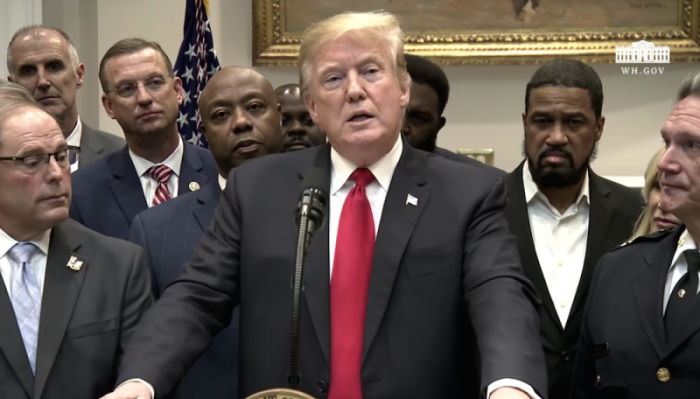Evangelicals hail Senate passing bipartisan prison reform bill, despite some Christian opposition

The U.S. Senate voted 87-12 to pass the First Step Act, a major prison reform bill, which has received evangelical support but also some Christian opposition.
Russell D. Moore, president of the Ethics & Religious Liberty Commission of the Southern Baptist Convention, tweeted his thanks to the Senate for the vote on Tuesday.
"The #FirstStepAct has been a long time in the making, and it is a good and needed development," Moore wrote.
The ERLC added in a tweet of its own that "this criminal justice reform bill has been a key part of our legislative agenda and we are thankful for the broad coalition that led to this victory!"
Prison Fellowship, America's largest outreach to prisoners, and one of the biggest Christian ministries to push for the bill, applauded the Senate for passing the First Step Act.
"This legislation will help reduce recidivism by preparing men and women to fulfill their God-given potential through restorative programming, including improved substance-abuse treatment programs, life-skills classes, and vocational training — building job readiness to fuel local economies. This is about getting smart on crime by giving men and women, made in the image of God, the tools to change their lives," said James Ackerman, president and chief executive officer of Prison Fellowship.
Craig DeRoche, senior vice president of advocacy and public policy, added: "Today, the Senate refused to double down on the failed policies of the past. The FIRST STEP Act's passage reflects America's growing demand for smarter and more restorative solutions to crime."
The bill includes efforts to reduce the federal recidivism rate, and offers time credit incentives for federal inmates to participate in rehabilitative and vocational training programs.
Among the other notable provisions, it reduces the second strike mandatory minimum of 20 years to 15 years, while the 3rd strike goes down from a mandatory minimum of life in prison to 25 years.
"This bill in its entirety has been endorsed by the political spectrum of America," said Sen. Richard J. Durbin, D-Ill, one of the legislation's main backers.
"I can’t remember any bill that has this kind of support, left and right, liberal and conservative, Democrat and Republican," he added, according to ABC News.
The New York Times pointed out that one of the major effects will be that thousands of inmates will become eligible for immediate sentencing reductions, while thousands of new offenders will receive reduced sentences.
“We’re not just talking about money. We’re talking about human potential,” Senator John Cornyn, R-Tex., said on Tuesday.
“We’re investing in the men and women who want to turn their lives around once they’re released from prison, and we’re investing in so doing in stronger and more viable communities.”
Despite the strong bipartisan backing and evangelical support, more liberal Christian bodies, such as the National Council of Churches of Christ in the USA, which includes various mainline Protestant denominations, had argued that the changes do not go far enough.
“The United States is home to 5 percent of the world’s population and 25 percent of the world’s prison population. The current mass incarceration crisis was birthed out of racist intentions, and we must be just as intentional about addressing the embedded racism if we are to have any meaningful reform. This bill does not move us any closer to justice on either issue,” the NCC had argued earlier in December.
One proposal in the bill that the NCC strongly opposed was the use of electronic monitoring as a form of surveillance for released prisoners.
President Donald Trump meanwhile took to Twitter to explain his support for the First Step Act, which he backed in November.
"America is the greatest Country in the world and my job is to fight for ALL citizens, even those who have made mistakes. Congratulations to the Senate on the bi-partisan passing of a historic Criminal Justice Reform Bill," Trump tweeted on Tuesday.
"This will keep our communities safer, and provide hope and a second chance, to those who earn it. In addition to everything else, billions of dollars will be saved. I look forward to signing this into law," he added.
The bill will now have to go back to the House, where an initial version was approved earlier in 2018. If, as expected, it passes there again, it will be presented to Trump for his signature.















![[Ready to PUB] Christian psychologist: Kids must develop 'resilience' to fulfill God's purpose for them](https://cdn.christianpost.com/images/cache/thumbnail/25/92/259219_a_300_200_658_146.jpg)











